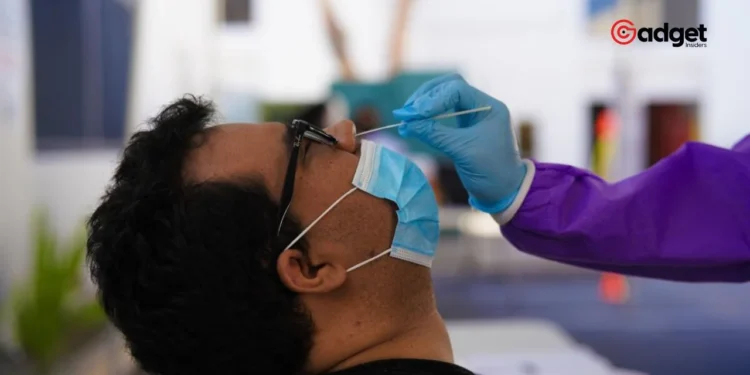During the early days of the COVID-19 pandemic, the world grasped the importance of collective health measures like never before. It seemed an era of heightened awareness and action was upon us, with expectations for enduring changes in public health behaviors. However, the decline in demand for COVID testing has painted a different picture, revealing the harsh realities of fading vigilance and political controversies.

From Booming to Bankrupt: The Rise and Fall of Cue Health
Cue Health, once a beacon of innovation in rapid COVID-19 testing, has declared bankruptcy, closing a chapter on what many saw as a promising solution to pandemic challenges. Founded in 2010, Cue Health soared to a market capitalization of $2.3 billion at its peak, promising fast, lab-quality testing accessible outside traditional medical settings. “We designed and developed a new molecular testing platform bringing lab complexity to an easy-to-use, portable device,” boasted the company’s early statements.
Despite early success and endorsements from major leagues like the NBA and the Department of Defense, the fading pandemic and subsequent reduction in testing demand have taken a toll. The company’s IPO shined briefly at $16 per share in 2021, reaching highs of $20.55, but as the urgency of COVID-19 waned, so did Cue Health’s fortunes. By early 2023, the stock had plummeted by 97%, a stark indicator of its diminishing relevance.
Cue Health’s Struggle Against Market Realities
The decline in testing wasn’t just a result of the pandemic’s end but also stemmed from political resistance to pandemic-related precautions, which became viewed by some as overly cautious or politically charged. This shift significantly impacted companies like Cue Health, which relied on sustained demand for regular COVID-19 testing. The broader biotech sector felt this impact, with the iShares Biotechnology ETF (IBBQ) dropping 36% from its 2021 peak.

Final Days and Liquidation
Attempts to diversify products and tap into new markets failed to save Cue Health. In May, just before its bankruptcy filing, the FDA issued a warning against using two of Cue’s products due to accuracy concerns. This was a final blow to a company already struggling with declining sales and investor interest. On May 28, Cue Health announced it would cease operations and liquidate, marking a somber end to a once-thriving enterprise.
Implications for the Healthcare Industry
The rise and fall of Cue Health serve as a cautionary tale about the volatility of the healthcare market during and after a global crisis. The initial influx of investment into health tech startups during the pandemic has not sustained, leading to a significant retraction in the sector. This scenario underscores the challenges of innovating in health technology — where rapid changes in public health dynamics and investor sentiment can dramatically alter a company’s trajectory.

Looking Ahead: Lessons Learned from Cue Health
As the dust settles on this chapter of pandemic-driven healthcare innovation, the industry must reflect on the lessons learned. The key takeaway is the critical need for flexibility and adaptability in health technology ventures, especially those pegged to crisis response. Cue Health’s story is a stark reminder of how quickly the winds can change in the healthcare sector, with public sentiment and political landscapes playing pivotal roles.
In conclusion, the disintegration of Cue Health from a promising leader to bankruptcy is a narrative that will resonate across the healthcare industry, serving both as a warning and as a guidepost for future endeavors in the volatile world of health tech innovation.










